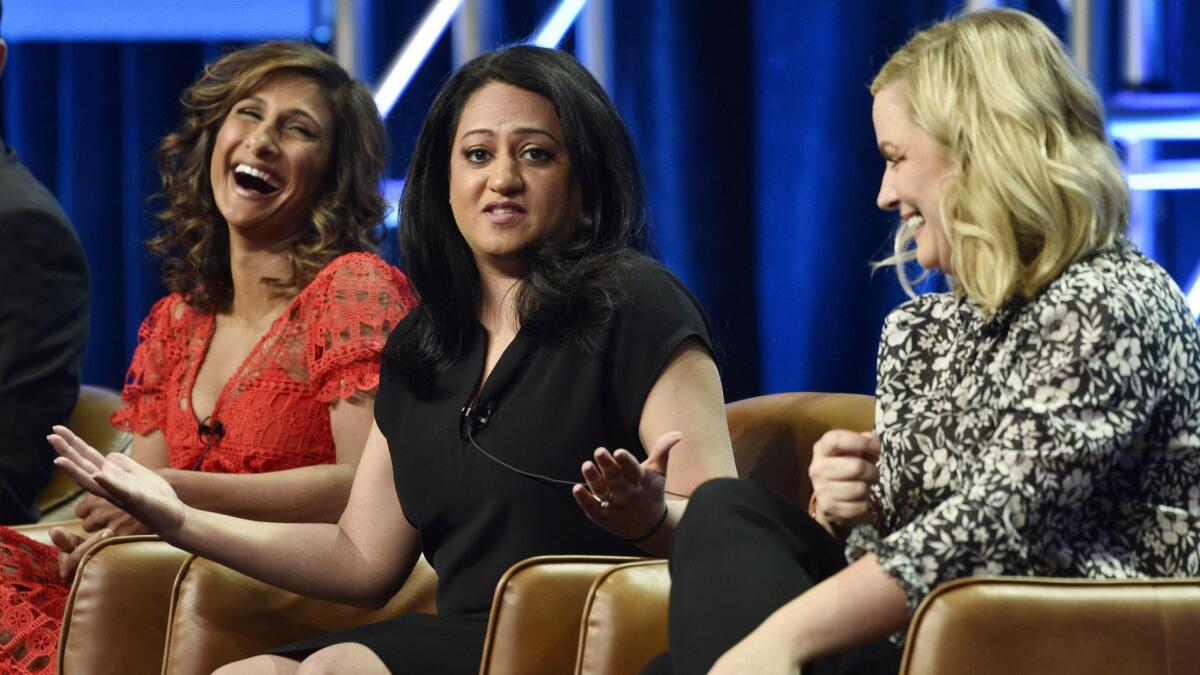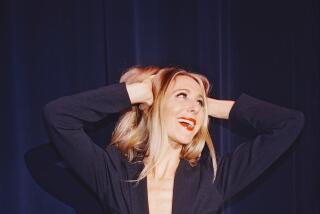The Amy Poehler-produced ‘I Feel Bad’ looks at the challenges facing working women — including in the writers room

Produced by Amy Poehler and Aseem Batra, “I Feel Bad” is a comedy that hopes to illuminate some of the struggles a working woman faces in attempting to “have it all” in balancing career, family and personal life.
Both women are TV comedy veterans, with Batra having worked on “Scrubs,” “Marlon” and “The Cleveland Show” and Poehler expanding upon her breakout roles on “Saturday Night Live” and “Parks and Recreation” to produce comedies like “Broad City.” And yet, in their presentation at the last day of the TCA summer press tour on Wednesday, one of the assembled journalists expressed semi-serious concern for the show’s male stars on the panel amid such a strong feminine perspective.
For the record:
2:25 p.m. Aug. 9, 2018For the record: An earlier version of this story mistakenly identified the main character’s job on “I Feel Bad” as behind the scenes on a TV show. She works in the videogame industry.
“What’s great about this show is that it’s about Sarayu [Blue’s] character, but what you get to see, and what everyone can relate to, is that all these people are living with a certain kind of modern anxiety they feel bad about,” said Paul Adelstein, who plays Blue’s husband on the show.
“I think it’s fair, everyone looks like an idiot,” added Brian George, who portrays the father of Blue’s character.
Batra couldn’t resist. “I think if we all work together,” she said playfully, reaching for her actors’ hands, “we can make sure men have their voice heard.”
Blue’s character works in the videogame industry. Within this setting, the creative team hopes to portray women’s challenges in the workplace, and to do so with an honesty not often seen onscreen.
“This is a lens,” Poehler said, “in which to tell a working woman’s story that I haven’t quite seen before, which is this idea that whenever we’re doing ‘it all,’ there’s about two or three things on that list we feel like we’re giving 10% to. I think Leslie [Knope, of “Parks and Recreation”] would be a fan of the show.”
The showrunners also touted the diversity of their writer’s room, which helps tell the story of an interracial couple from a South Asian perspective. But Batra pointed out how much she appreciates a television climate where that doesn’t have to be a focal point.
“What I’m excited about is the normalization of a family that looks like this,” she said. “Look, if we make room for all kinds of color on TV, then people can tell stories in different ways. ... In 2018 you can have a family that looks like this without that being a thing.”
This being 2018, the show also drew scrutiny for an upcoming scene in which the main character asks her young subordinates if she is still “doable,” a moment Batra said rose in part from her work experience.
“I’ve been the only woman in writers rooms all the time, and that’s how people talk, and the guys — if i tell you some of the things that men have said to me, it’s shocking,” she said as Poehler snickered.
“And in a way you get sucked up in that culture because they reject you unless you can be one of the guys, and I wish that in a 21-minute sitcom we could get into why that was,” she went on. “But I just wanted to show a moment that was really real for me, and I think things are changing now, which is great.”
But she stressed the difficulty of that moment. “I had to cut up with the guys like that, and it doesn’t feel good. But I promise you I wouldn’t be sitting here if I went, ‘Stop it. This is wrong, I don’t like this.’ They would’ve kicked me out.”
Follow me over here @chrisbarton.
ALSO:
More to Read
The complete guide to home viewing
Get Screen Gab for everything about the TV shows and streaming movies everyone’s talking about.
You may occasionally receive promotional content from the Los Angeles Times.







